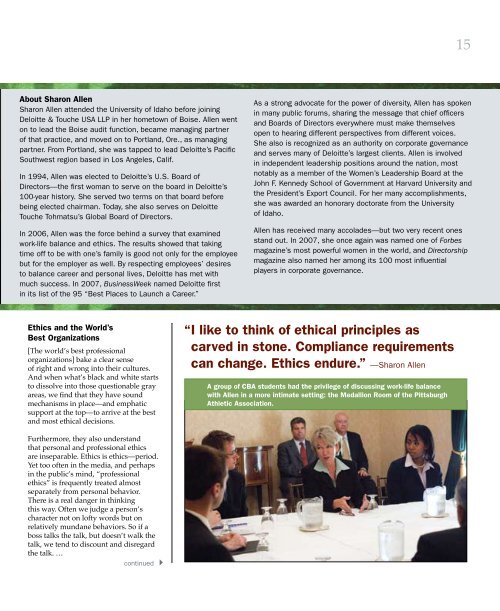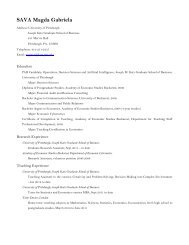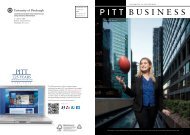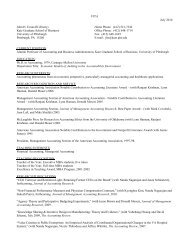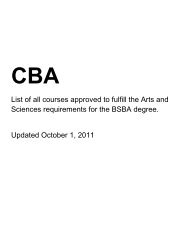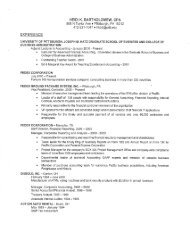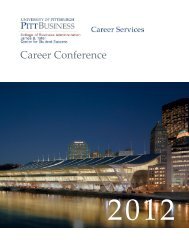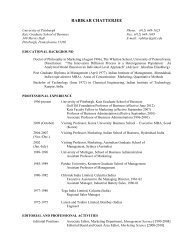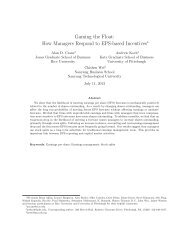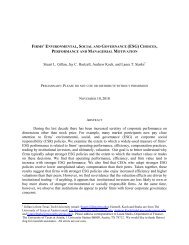Entrepreneurship - Pitt Business - University of Pittsburgh
Entrepreneurship - Pitt Business - University of Pittsburgh
Entrepreneurship - Pitt Business - University of Pittsburgh
You also want an ePaper? Increase the reach of your titles
YUMPU automatically turns print PDFs into web optimized ePapers that Google loves.
15<br />
About Sharon Allen<br />
Sharon Allen attended the <strong>University</strong> <strong>of</strong> Idaho before joining<br />
Deloitte & Touche USA LLP in her hometown <strong>of</strong> Boise. Allen went<br />
on to lead the Boise audit function, became managing partner<br />
<strong>of</strong> that practice, and moved on to Portland, Ore., as managing<br />
partner. From Portland, she was tapped to lead Deloitte’s Pacific<br />
Southwest region based in Los Angeles, Calif.<br />
In 1994, Allen was elected to Deloitte’s U.S. Board <strong>of</strong><br />
Directors—the first woman to serve on the board in Deloitte’s<br />
100-year history. She served two terms on that board before<br />
being elected chairman. Today, she also serves on Deloitte<br />
Touche Tohmatsu’s Global Board <strong>of</strong> Directors.<br />
In 2006, Allen was the force behind a survey that examined<br />
work-life balance and ethics. The results showed that taking<br />
time <strong>of</strong>f to be with one’s family is good not only for the employee<br />
but for the employer as well. By respecting employees’ desires<br />
to balance career and personal lives, Deloitte has met with<br />
much success. In 2007, <strong>Business</strong>Week named Deloitte first<br />
in its list <strong>of</strong> the 95 “Best Places to Launch a Career.”<br />
As a strong advocate for the power <strong>of</strong> diversity, Allen has spoken<br />
in many public forums, sharing the message that chief <strong>of</strong>ficers<br />
and Boards <strong>of</strong> Directors everywhere must make themselves<br />
open to hearing different perspectives from different voices.<br />
She also is recognized as an authority on corporate governance<br />
and serves many <strong>of</strong> Deloitte’s largest clients. Allen is involved<br />
in independent leadership positions around the nation, most<br />
notably as a member <strong>of</strong> the Women’s Leadership Board at the<br />
John F. Kennedy School <strong>of</strong> Government at Harvard <strong>University</strong> and<br />
the President’s Export Council. For her many accomplishments,<br />
she was awarded an honorary doctorate from the <strong>University</strong><br />
<strong>of</strong> Idaho.<br />
Allen has received many accolades—but two very recent ones<br />
stand out. In 2007, she once again was named one <strong>of</strong> Forbes<br />
magazine’s most powerful women in the world, and Directorship<br />
magazine also named her among its 100 most influential<br />
players in corporate governance.<br />
Ethics and the World’s<br />
Best Organizations<br />
[The world’s best pr<strong>of</strong>essional<br />
organizations] bake a clear sense<br />
<strong>of</strong> right and wrong into their cultures.<br />
And when what’s black and white starts<br />
to dissolve into those questionable gray<br />
areas, we find that they have sound<br />
mechanisms in place—and emphatic<br />
support at the top—to arrive at the best<br />
and most ethical decisions.<br />
“ I like to think <strong>of</strong> ethical principles as<br />
carved in stone. Compliance requirements<br />
can change. Ethics endure.” —Sharon Allen<br />
A group <strong>of</strong> CBA students had the privilege <strong>of</strong> discussing work-life balance<br />
with Allen in a more intimate setting: the Medallion Room <strong>of</strong> the <strong>Pitt</strong>sburgh<br />
Athletic Association.<br />
Furthermore, they also understand<br />
that personal and pr<strong>of</strong>essional ethics<br />
are inseparable. Ethics is ethics—period.<br />
Yet too <strong>of</strong>ten in the media, and perhaps<br />
in the public’s mind, “pr<strong>of</strong>essional<br />
ethics” is frequently treated almost<br />
separately from personal behavior.<br />
There is a real danger in thinking<br />
this way. Often we judge a person’s<br />
character not on l<strong>of</strong>ty words but on<br />
relatively mundane behaviors. So if a<br />
boss talks the talk, but doesn’t walk the<br />
talk, we tend to discount and disregard<br />
the talk. …<br />
continued 4


